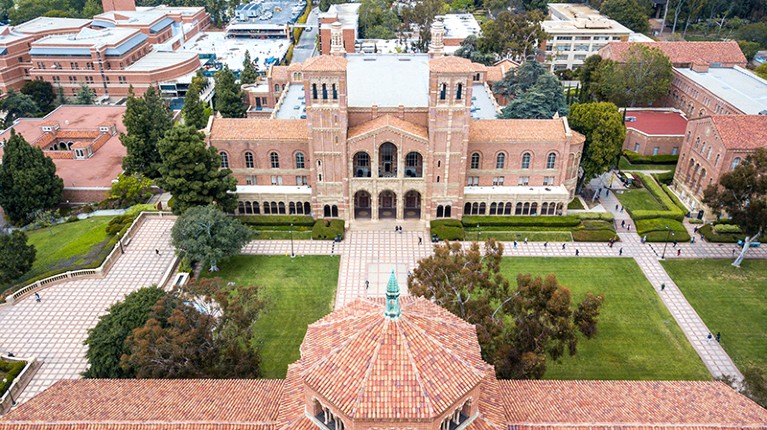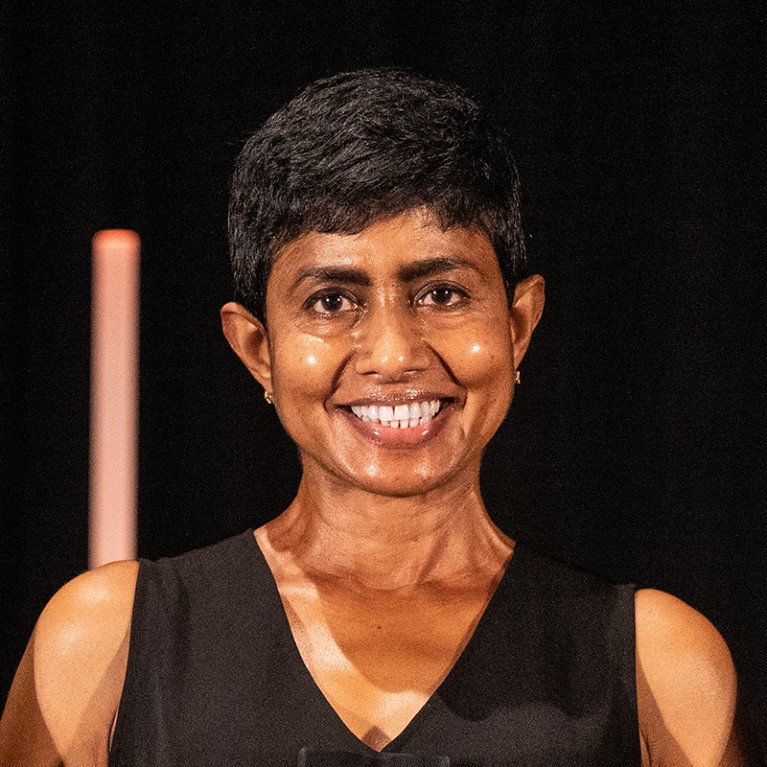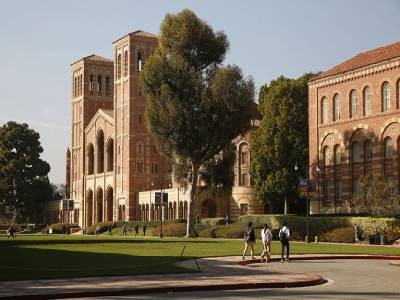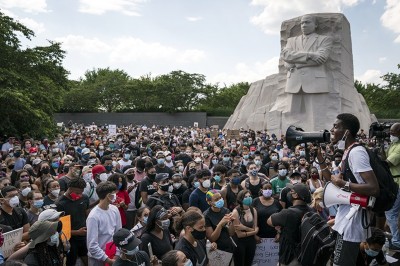
The University of California, Los Angeles, has imposed sanctions on ecologist Priyanga Amarasekare. Scientists around the world are calling for an explanation.Credit: Roy Johnson/Alamy
In March 2022, a committee at the University of California, Los Angeles (UCLA), found that ecologist Priyanga Amarasekare had breached the faculty code of conduct, most notably by violating confidentiality and procedural rules when criticizing her colleagues and department policies, according to documents obtained by Nature. The committee recommended she be given a letter of censure and five years of probation. UCLA chancellor Gene Block instead issued much harsher penalties, including a one-year, unpaid suspension that effectively stranded her research projects and cut off communication with her students.
Scientists petition UCLA to reverse ecologist’s suspension
Over the past several weeks, nearly 500 scientists from around the world have signed a petition calling on UCLA to either reverse the suspension or explain the nature of the allegations against Amarasekare. Originally from Sri Lanka and one of two tenured women of colour in her department, Amarasekare had accused colleagues of discrimination, and her supporters argue that UCLA retaliated against her for speaking out. The sanctions levied against her, they say, are normally applied only in cases of the most egregious misconduct.
The documents received by Nature — including the letter of censure — contain no accusations of academic misconduct or illegal behaviour, and instead focus on personnel and procedural issues.
“Priyanga is not a warm, fuzzy person, and she does not suffer fools”, but that is not a crime, says a long-time UCLA faculty member who declined to be named out of fear of retaliation. Like many institutions, UCLA has been promoting its efforts to increase equity and diversity, and Amarasekare “is being sacrificed because she’s upsetting that picture”, the faculty member says.
Amarasekare’s students in the Department of Ecology and Evolutionary Biology have been caught in the middle. Some testified in Amarasekare’s defence during a faculty hearing in September 2021, with the understanding that their identities would be kept confidential, but current and former students told Nature that their identities and testimony were leaked. They complained to chancellor Block of being exposed to “differential treatment” as a result.
Scientists question Max Planck Society’s treatment of women leaders
Most current students declined Nature’s requests for interviews, but one, speaking on the condition of anonymity out of fear of retaliation, described a persistent state of anxiety and confusion because of their treatment by the department, and said they no longer feel comfortable there.
UCLA declined to discuss the contents of the documents and communications seen by Nature, or the arguments of critics, stating, as it has previously, that privacy rules prevent it from elaborating on personnel matters. Block declined to be interviewed or to answer questions regarding his handling of the case.
In a statement, however, the university raised questions about one of the documents obtained by Nature, a report from the hearing committee that was redacted to remove specific names, allegations and testimonies. The unauthorized release of such a report “risks presenting an incomplete and misleading characterization of proceedings and infringing on the confidentiality of witnesses”, the statement says. The university also says it supports freedom of expression and does not condone retaliation of any sort.
Amarasekare declined to comment.
Longstanding tension
The documents shed light on longstanding tension between Amarasekare and department leadership. Despite receiving numerous accolades, including one of the top prizes in ecology last year, she has been repeatedly denied promotions that she requested. She has also developed a reputation for raising difficult issues and challenging department decisions and policies.
The situation came to a head in the wake of George Floyd’s murder in May 2020, when the department opened an e-mail forum to allow staff members and students to discuss racism, inclusion and equity. After some weeks, Amarasekare openly shared her experiences at UCLA, naming leaders who she said had censored her communications, blocked her advancements and ignored her requests to serve on committees.

Amarasekare was awarded the Robert H. MacArthur Award by the Ecological Society of America last year.Credit: The Ecological Society of America
“This is the department that I know, an entity that preaches diversity and inclusion but practices homogeneity, exclusion and suppression of dissenting voices,” she wrote in an e-mail to the group in August 2020.
The e-mail was greeted with broad support from students and postdocs — as well as some discomfort. Few doubted her intentions, say current and former students, but she struck a negative chord for some when she criticized the department for appointing three white faculty members to the racism task force — alongside one “white-skinned Hispanic” researcher and one “token” Black student.
Supporters say that e-mail helped to spur UCLA’s investigation into Amarasekare. The hearing committee report supports this idea. The document says that although she “has the right to criticize and seek revision of policies”, she must abide by existing university rules. “In particular, she must refrain from accusing individuals of wrongdoing outside of the confidential processes in place for such allegations,” it says.
Discrimination in academia
Some observers say the case speaks to a broader problem in academia. Although professors have a right to allege discrimination without fear of retaliation, universities can get around that by arguing that whistle-blowers are troublemakers who ignore the codes of conduct, says Marcia McCormick, co-director of the William C. Wefel Center for Employment Law at St. Louis University in Missouri.
The university’s behaviour towards Amarasekare “is as bad as it looks”, says Angie Beeman, a sociologist at Baruch College in New York City who studies racism in academia and reviewed the documents and communications obtained by Nature. “Universities have to develop mechanisms to protect and support faculty and staff of colour when they speak out, rather than accommodating the hurt feelings of those in dominant positions,” she adds.
UCLA did not answer Nature’s questions about whether it investigated Amarasekare’s allegations.
UCLA ecologist controversy: university vice-chancellor responds
On 25 March last year, a few weeks after the hearing committee issued its decision, Amarasekare argued in a letter to Block that the process had been flawed. She pointed him to testimony by a fellow faculty member of colour who said that they had also experienced discrimination in the department. She also sent him an independent review, conducted in 2014, that found bias in the department’s denial of a promotion she sought in 2013. Nature identified a scientist on that 2014 panel, who spoke on condition of anonymity and confirmed Amarasekare’s account. “We were absolutely flabbergasted”, the scientist says of the panel. The process of reviewing her promotion “was incredibly biased and very dishonest, and we asked for some kind of censure for the department”.
UCLA declined to discuss the findings of the 2014 report, but said in its statement that academic promotions are based “strictly on evaluation of teaching, scholarly research, and service — not disciplinary or grievance activities”.
Caught in the middle
The dean of life sciences, Tracy Johnson, informed Amarasekare’s students that the ecologist was “on leave” — and that they could no longer contact her — on 8 July 2022, a week after Block issued his decision to suspend her. Questions immediately arose about how to proceed in the laboratory, which currently includes three graduate students and around ten undergraduates, who help to maintain insect colonies and run long-term experiments exploring the ecological impacts of global warming.
Grieving and frustrated: Black scientists call out racism in the wake of police killings
Johnson and ecology department leaders ultimately advised the graduate students — two of whom are in their fifth year and preparing to graduate — to find new advisers and dissertation projects. Unable to publish their research or ask for letters of recommendation from Amarasekare, they feel abandoned, says the student who spoke to Nature. Johnson did not respond to a request for comment.
Kurt Anderson, an ecologist at the University of California, Riverside, and one of the students’ external advisers, sought to intervene with a compromise solution that would allow the students to interact with Amarasekare through an intermediary. “We pushed on that, but it was always rebuffed in the strongest of terms,” he says.
The three graduate students described their situation in a letter to Block on 24 August 2022, accusing the university of “blatant retaliation” for their testimony in support of Amarasekare, and requesting that she be allowed to continue as their adviser. In an e-mail response more than three weeks later, Block assured them that “any actions taken by your Department are designed to protect professor Amarasekare’s right to privacy, as well as to support your progress”. He said the department would inform them of “administrative remedies” they could pursue if they felt their rights and privileges had been violated.
UCLA declined to address the students’ accusations in its statement to Nature, but said that in such situations the university works with students to identify faculty members and provide resources and space “to continue research projects or identify appropriate new projects”.
Five months after writing to the chancellor, the lab member who spoke to Nature says that the graduate students remain stuck. “Nothing, absolutely nothing, has changed.”




